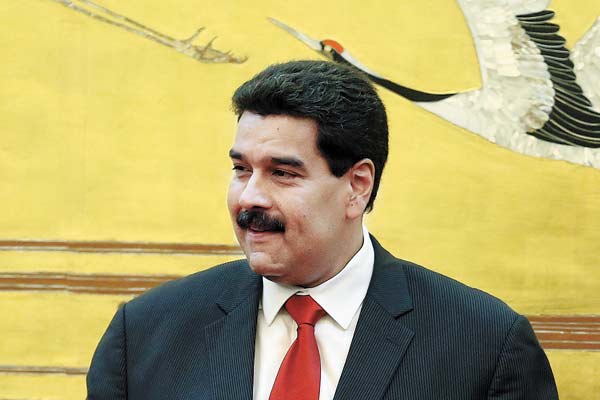Strong strategic partnership
Bilateral ties between Beijing and Caracas are developing at strikingly fast speed in all aspects for benefits of both
If the economic exchanges between the United States and Latin America are still much larger than trade between China and Latin America, the speed of change which characterizes the relations between China and Latin America is striking. A decade ago commerce between China and what was often referred as the US' backyard was marginal, now it is worth over $250 billion.

Visiting Venezuelan President Nicolas Maduro arrives at the Great Hall of the People in Beijing on Sunday. [Photo/China Daily]
Within the dynamics of relations between China and the Community of Latin American and Caribbean States, relations between China and Brazil, Mexico and Argentina constitute intra-G 20 interactions, but when, 12 years ago, Jiang Zemin and Hugo Chavez decided to forge a strategic partnership, the two leaders gave relations between China and Venezuela special significance.
Nicolas Maduro, who is visiting China for the first time as president of the Bolivarian Republic of Venezuela from Sunday to Tuesday, developed strong connections with China during his six years as minister of foreign affairs, and he visited China six times after he took office in 1999.
A series of high level exchanges have set the stage for Maduro's visit, in May, Li Yuanchao, China's vice-president was in Caracas, Venezuelan Oil and Mining Minister Rafael Ramirez visited China in June, and, in the following month, both the President of the Venezuelan National Assembly Diosdado Cabello and Jorge Arreaza, Venezuela's vice-president, had discussions in Beijing with their Chinese counterparts.
Relations between China and Venezuela are comprehensive, encompassing the economic, cultural, political, military and geopolitical. China is Venezuela's second-largest trade partner, and Venezuela ranks fourth among China's Latin American trade partners. Last year 15 percent of Venezuelan exports were absorbed by the Chinese market, while 17 percent of Venezuela's imports came from China. Bilateral trade grew from $350 million in 2000 to $23 billion in 2012. Beijing has provided over $36 billion in financing to Caracas and the strategic partnership is expressed in more than 300 agreements of cooperation.
China shares technology with Venezuela. Beijing supplied Venezuela's first satellite VENESAT-1 Simon Bolivar in 2008, and Beijing has just delivered full control of the second one the Miranda satellite launched into orbit from China last year. Huawei, the Chinese global information and communications technology firm, established its first company store outside its country of origin in Venezuela.
Cooperation in infrastructure, at the Port of Cabello and in railways, and in energy three new electricity plants will be built by 2016 also benefits the 30 million inhabitants of Venezuela.
Moreover, the relations between Beijing and Caracas include military ties. Venezuela bought Chinese-built Hongdu JL-8 trainer jets, also known as the Karakorum-8, and a Shaanxi Y-8 military cargo plane operated by the Venezuelan Air Force recently delivered humanitarian assistance to Syrian refugees in Lebanon.

























